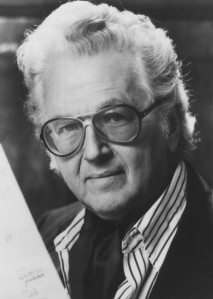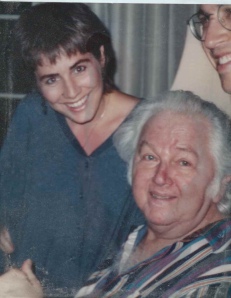I was about two years pregnant and poised at the concert grand in a modern music salon-style recital in Los Angeles. It was 1993 and my belly doubled as an elbow rest while performing the world premiere of the first two of what was to be a series of twelve of Mel Powell‘s Preludes for Piano. As far as I know, the anticipated ten never materialized, except for perhaps in sketch form in one of the many stacks of composition notebooks he left behind. Mel’s work was based in atonality and serialism, but my usually active unborn baby was motionless throughout the demanding performance.
After the concert, Mel joked about the inflated size of my milk makers and their obvious hindrance for arm-crossing tactics during difficult technical passages. He also commented on the heteromorphic shape of my belly and the post-performance alien-like motion of my infant while musing on the odd and humorous discovery that during my performance, his work could be perceived as a lullaby. He complimented my playing and promised me ten more preludes, but was clearly more impressed by my obvious acrobatics in maneuvering around embryonic obstacles to reach the keyboard. I adored that man.
Mel Powell is one of a small handful of people I have come across who is genuinely worthy of the title “true genius.” His ability to cross over between the improvisatory world of jazz as a teenage pianist and arranger for Benny Goodman to the meticulously mathematically structured compositions of Bach’s Well Tempered Clavier and further to his own groundbreaking compositions in the area of serial music (along with Milton Babbitt) was extraordinary. Those of us who were lucky enough to be in attendance at a composer’s concert in the late eighties got to witness one of the last times Mel sat at the piano in a public setting. It was after the concert in the foyer outside the R.O.D. in the Cal Arts music department. Mel casually sat at the piano and flawlessly accompanied the creamy voice of Milton Babbitt, gifting us with a teasing taste of jazz standards. It was breathtaking.
Mel, deserving recipient of the 1990 Pulitzer Prize in music, was not just a remarkable musician. He was a beautiful human. During my first year as a grad student, I was preparing my mid-residence solo recital, which included Dmitri Shostakovich’s Concerto in C Minor for Piano, Trumpet and String Orchestra. I was having trouble finding string players willing to volunteer to play the piece and sat on the floor outside the music department office feeling sorry for myself. Mel approached and asked what was bothering me and as was his style in everything, he charmingly cheered me up and went off to teach a counterpoint class. That afternoon I learned from a dear friend who worked in the office that the music department would be providing funding for me to hire outside musicians. What I later found out (and was sworn to secrecy) was that the money came not from a scholarship fund, but from Mel’s personal pocket. He never found out that I knew.
During my pregnancy and in addition to Mel’s work, I almost exclusively practiced and performed the works of modern and experimental composers. Once Morgan arrived I did not want to be an absent concert-touring mom, so I temporarily stepped away from my professional career as a pianist, leaving her the only one of my three children exposed, in utero, to my professional work.
Many studies have been done on the subject of our babies’ uterine environmental exposure and the ways in which they absorb language and sounds while still in the womb. In addition to eating right (except for all that meatloaf and macaroni and cheese, hence the giant belly and breasts – and don’t even get me started about my butt), exercising and reading everything I could on child development during my first pregnancy, I continued my CD and live performance exploration of multiple musical genres. And there was all that atonal piano practicing and experimental rehearsals and performances with assorted musicians.
Our children can hear us before journeying through the birth canal. We so eagerly await the arrival of this little person, a blank canvas, an untouched musical staff, an empty manuscript. Parents fall into the trap of believing they are the artists, the composers, the scribes. And as the years pass, many of us tend to forget that, not only do they continue to hear and absorb everything, but they get better at it. They listen to everything we say and how we say it, thirsty for guidance and education. When Morgan first arrived, I knew she could not yet speak our language, but what she somehow managed to communicate to me was this:
“I am a child. Pay close and quiet attention to me. Give me brushes and colors, instruments and blank notation paper, pens, pencils, empty journals, composition books and clay. Observe what I respond to and provide me with more abstract materials based on what you see. Stay close enough to keep me from serious danger, but far enough for me to find my own way. Let me be my own sculptor. Give me no criticism and give me no praise. If I choose to talk about my creations, please listen, ask questions you would ask an artist you respect and comment without judging.”
In raising all three of my children, I have worked at not losing sight of that message. I have been criticized for being too lenient with my kids, because I have never punished them. Not ever. I believe there is a fine line between too much leniency and a proper balance of guidance and respect. Punishment, whether verbal or physical, sends the wrong message and hinders their process.
How we speak to them is obviously not just important in the area of the arts and their individual creativity. Communication is collaborative and I never wanted to fall into the trap of talking “at” my kids, but rather “with” them. One area where many parents hit a roadblock is in the event of divorce. No matter what the situation, we must refrain from making disparaging comments about the other parent. Children are products of us. They view themselves as half their mother and half their father (or half of each of their mothers, half of each of their fathers, or a number of other possibilities, depending on the family structure). When we say negative things about another parent, we may as well direct those comments at our child or children, because that is how they absorb them.
Music has always been a very important part of my life. I do not advocate the sudden placement of Mozart-blasting headphones on your pregnant belly or spooning your Wagner-crooning stereo speaker while you sleep. I believe there to be an over-abundance of genius-seekers hoping against hope for the creation of baby Beethovens and Einsteins, which ultimately puts pressure on our kids and leaves them in the position of feeling judged. But if adding music to your (and your baby’s) life is something that brings you joy, your baby will pick up on that and that is a great thing.
After a twenty-three year educational hiatus, I decided to go back to California Institute of the Arts and complete my MFA in piano performance. The course work had been done. What remained were a couple of independent study projects and my solo graduation recital. I consulted with my children while making this decision because, being a single parent and their only caregiver, I knew they would have to make sacrifices. They could not have been more supportive. They endured countless sunrises waking up to Mozart, Chopin, Liszt and Ligeti with just a thin wall separating my piano from Morgan’s and Wendy’s bedroom and just a hop, skip and a jump away from Thomas. Wendy and Thomas slept through almost everything. On many mornings, Morgan moved from her room to my room on the opposite side of the house to escape the noise with one exception. She slept like a baby through Ligeti’s Etude No. 13, L’escalier du diable (The devil’s staircase). What is remarkable about that is my monotonous preparation of what many might perceive to be an inaccessible piece to the average listener was enough to drive the sanest person to sprint from the house seeking sanctuary for their ears. It has turned out to be one of my favorite pieces of all time, and also one of the most difficult. I believe there is a direct correlation between its soothing aspects to Morgan during those early morning hours and what she experienced in her pre-birth environment.
Morgan is a writer finishing up her college senior year. I have watched her writing process since she began her first novel at the age of fourteen. Every novel has a soundtrack, each chapter a different song or piece. I have occasionally wondered about the fact that none of my three children have turned out to be musicians, and then one day, Morgan came to me and said, “Mommy, I am so happy you have exposed me to so much music. It is such a big part of my writing.”
Mel Powell was a rare genius and an incredible influence on my musical education. He exuded a movie-star charisma and, during his time there, was the pied piper of the Cal Arts music department. Everyone who knew him loved him. I could never replace the impact he has had on my life as a musician and as a person. I believe that he had an indirect and positive impact on my child and I will always be grateful that her very first lullaby came from the heart of Mel Powell.






Awwww I think this is my favorite one so far.
LikeLiked by 1 person
As you know, Mel never blushed, Trina. But I am sure you make him blush when he reads this while he is joking with Ligeti, appropriately in Heaven, about the Devil’s Staircase. You nailed it, again. Beautifully.
LikeLiked by 2 people
Thank you Frans. You are another mentor and role model I will always love and value.
LikeLike